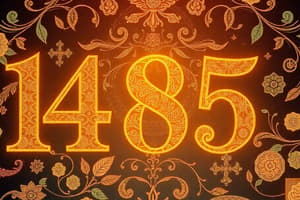Podcast
Questions and Answers
What is the unique non-negative integer r in Euclid's Division Lemma if m = 20 and n = 7?
What is the unique non-negative integer r in Euclid's Division Lemma if m = 20 and n = 7?
- 6
- 5
- 3
- 4 (correct)
Which theorem states that every integer greater than 1 can be written uniquely as a product of prime numbers?
Which theorem states that every integer greater than 1 can be written uniquely as a product of prime numbers?
- Properties of Integers Theorem
- Fundamental Theorem of Arithmetic (correct)
- Euclid's Division Lemma
- Irrational Numbers Theorem
Which number is an example of an irrational number from the text?
Which number is an example of an irrational number from the text?
- $\frac{1}{3}$
- $\frac{22}{7}$
- $\frac{5}{8}$
- $\sqrt{3}$ (correct)
What property do all rational numbers have in common?
What property do all rational numbers have in common?
If m = 13 and n = 3 in Euclid's Division Lemma, what is the value of q?
If m = 13 and n = 3 in Euclid's Division Lemma, what is the value of q?
What property of integers states that they are closed under both addition and multiplication?
What property of integers states that they are closed under both addition and multiplication?
Which concept in number theory states that every integer greater than 1 can be expressed as a product of prime numbers uniquely?
Which concept in number theory states that every integer greater than 1 can be expressed as a product of prime numbers uniquely?
What type of numbers include all integers and can be expressed as a ratio of two integers?
What type of numbers include all integers and can be expressed as a ratio of two integers?
Which property characterizes integers by their ability to maintain the same value under addition or multiplication regardless of the order of the operands?
Which property characterizes integers by their ability to maintain the same value under addition or multiplication regardless of the order of the operands?
Which concept relates to numbers that cannot be expressed as a ratio of two integers and have non-repeating, non-terminating decimal representations?
Which concept relates to numbers that cannot be expressed as a ratio of two integers and have non-repeating, non-terminating decimal representations?
Flashcards are hidden until you start studying
Study Notes
Real Numbers
In mathematics, real numbers form the primary kind of number used in measuring and counting. They include all rational numbers and more values, such as square roots and mathematical constants like pi. In this article, we will discuss various properties and concepts related to real numbers, including Euclid's Division Lemma, the Fundamental Theorem of Arithmetic, irrational numbers, properties of integers, and rational numbers.
Euclid's Division Lemma
Euclid's Division Lemma states that given any two positive integers m > n, there exist unique non-negative integers q and r such that m = nq + r, where 0 ≤ r < n. This lemma is often referred to as the 'division algorithm'. It is fundamental to understanding many aspects of algebra and number theory.
Fundamental Theorem of Arithmetic
The Fundamental Theorem of Arithmetic establishes that every integer greater than 1 can be written uniquely as a product of prime numbers. For example, the integer 24 can be expressed as 2 * 2 * 2 * 3, where each prime factor has a corresponding exponent indicating how many times it appears.
Irrational Numbers
Irrational numbers are numbers that cannot be expressed as simple fractions or ratios; they do not have finite decimal expansions. Examples of irrational numbers include the square root of 2 (√2) and the number pi (π). These numbers have infinitely repeating decimals which never settle into a fixed cycle.
Properties of Integers
Integers are a subset of real numbers and have certain unique properties. For instance, integers are commute, associative, and have an identity element, one. They are also closed under addition and multiplication.
Rational Numbers
Rational numbers are numbers that can be expressed as a ratio of two integers, such as 3/4 or 22/7. They include all integers and have finite decimal expansions. Rational numbers can be classified as fractions, ratios of integers, or repeating decimals.
In conclusion, real numbers are a rich and diverse set of numbers that include both rational and irrational values. The properties and concepts discussed, such as Euclid's Division Lemma, the Fundamental Theorem of Arithmetic, irrational numbers, and rational numbers, provide a strong foundation for understanding the nature of numbers and their relationships.
Studying That Suits You
Use AI to generate personalized quizzes and flashcards to suit your learning preferences.




